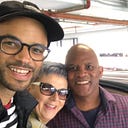Beans by Mary Oliver
Or Pops, birthdays, and actualizing potentialities
Plumpness isn’t for them. They like
being lean, as if for the narrow
path. The beans themselves sit qui-
etly inside their green pods. In-
stinctively one picks with care,
never tearing down the fine vine,
never not noticing their crisp bod-
ies, or feeling their willingness for
the pot, for the fire.
I have thought sometimes that
something―I can’t name it―
watches as I walk the rows, accept-
ing the gift of their lives to assist
mine.
I know what you think: this is fool-
ishness. They’re only vegetables.
Even the blossoms with which they
begin are small and pale, hardly sig-
nificant. Our hands, or minds, our
feet hold more intelligence. With
this I have no quarrel.
But, what about virtue?
If Pops was anything but Pops, he would most certainly have been a bean. A lean, crisp bodied, Lompoc Pinto bean. Of the purely virtuous variety. Willingly picked for the pot, if for no other reason than to better flavor his infamous split pea soup. Which, of course, was his gift to us. His love, passionately prepared and served. With extra helpings always available.
Today, on my 33rd birthday, I thought that Pops must be watching me, cycling to Kasur as I listened to Man’s Search for Meaning, a book I discovered on my 29th birthday after (what seemed like) a nearly fatal cycling accident in SF.
The author, Dr. Viktor Frankl, was a man from an era that Pops carried with him in his vines and his stories.
I thought of how Pops bared his suffering after Nana passed, somehow understanding that this was necessary in order to avoid the alternative, which was that Nana suffer and endure his passing first. As Viktor Frankl once said to a patient in Pops’ situation: Such a suffering has been spared her, and it was you who has spared her this suffering — to be sure, at the price that now you have to survive and mourn her.
Pops, perhaps more than anyone, taught us how to accept and bear our sufferings, how to be worthy of our suffering. Adding a deeper meaning to his life (and to ours).
3 years after Nana passed, in 2011, Pops was diagnosed with cancer — the terminal kind — which “gifted” him another chance to prove worthy of his suffering, and to teach us that love (e.g., his marriage to Grandma Lee), and adventure (their train trek to NY), and laughter can grow from the vine of uncertainty.
After I heard the diagnosis, I thought for what felt like hours (or lifetimes) about what to say, how to provide the lightness for Pops that he had always provided for us (but would most certainly not be able to provide this time around). And yet, I quickly learned that Pops was a bean who didn’t give up his job responsibilities without a fight.
On the phone, I asked him how he was managing, and I will never forget his response: “You know Benj, no matter what happens, you just gotta keep your pecker up.”
With my mouth now wide open, I finally managed to say that I didn’t know if this was one I could write home to the kids about. Little did I know that this was like the tennis serves he used to deliver when I was 11. And my return was exactly as he had (masterfully) planned. Now it was time for his drive-volley overhead-smash: “What are you talking about Benj? A pecker is your chin… You need to get your head out of the gutter!”
And there it was, 40-love, game, set, match.
Viktor Frankl writes that humor, more than anything else, can afford an aloofness and ability to rise above any situation, even if only for a few seconds. “To see things in a humorous light is some kind of a trick learned while mastering the art of living.”
And Pops was nothing if not a master trickster, and through his tricks he taught us one of the deepest lessons about the art of living.
Because of these lessons, I’ve been asking myself what type of art I might produce with my life. What is it life is asking of me? Can I also be a bean and how can I also accept giving the gift of my life in order to add to the pot?
I don’t know answers to these questions, or what I’m capable of doing. But I do know that Pops taught me how to tie my shoes, to catch a fish, to sit in a car for hours/days, to play solitaire and backgammon, to listen to Miles Davis and John Coltrane, to eat Denny’s Grand Slams and Quaker oatmeal and Chevy’s refried beans.
And because of his love, I’m realizing what other potential might be inside of me, “that which is not yet actualized but yet ought to be actualized.” As Frankl writes:
by making the beloved aware of what he can be and what he should become, the one who loves makes the beloved’s potentialities come true.
Perhaps this is one of Pop’s final gifts to the pot. But perhaps it might also turn out that this is how the vine can grow wider and deepen in order to produce more beans and more split pea soup.
